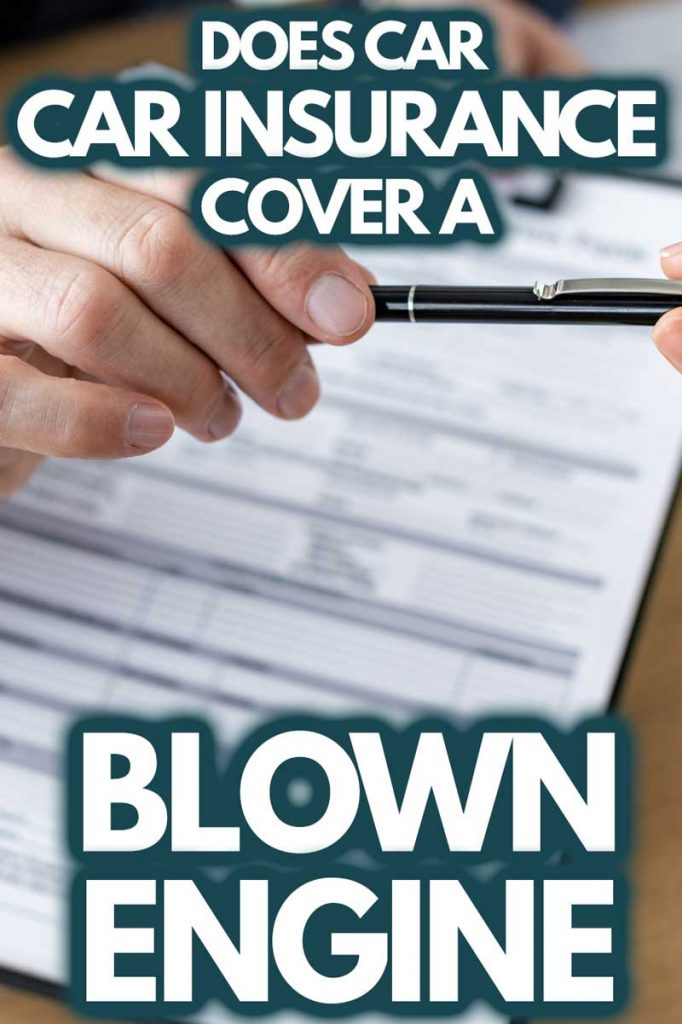Auto insurance covers plenty of vehicle problems… But does your car insurance cover a blown engine? We’ve researched the subject in-depth and have some surprising information to share about insurance coverage and your engine replacement.
Car insurance will often cover a blown engine. However, what they include depends on the type of policy you have, how much your deductible is, what kind of vehicle you drive, what caused the blowout, and the overall value of the car. Sometimes, they won't cover the damage at all.

We know that’s a lot to take in. The bottom line is that many variables dictate whether insurance will cover your vehicle’s major repairs. But don’t worry—we’ll explain things in more detail here.
Will Full Coverage Cover a Blown Engine?
Figuring out whether your full coverage insurance will cover a blown engine can be complicated. Comprehensive coverage refers to more than primary liability, which is what pays out if you cause an accident where other peoples’ property (or bodies) are damaged.
Typically, full coverage includes comprehensive and collision additions. Comprehensive policies usually handle all incidents that aren’t an actual crash. For example, it can cover animal damage, natural disasters like trees falling on your roof, and other hazards. Collision insurance explicitly addresses the replacement or repair of your auto when you hit another car or an object.
Unfortunately, neither of these options will pay for engine repairs—except in specific circumstances.
Getting a Blown Engine Covered
If your engine damage issue stems from an existing, legitimate claim, the insurance company will work with you on a solution.
For example, if you get into a crash and the damage from the accident wrecks your engine, you might be able to get it repaired on the insurance company’s dime. Of course, if the amount of damage exceeds the vehicle’s value, buying a new car is likely a better idea.
In other cases, a ruined engine could have a cause that is covered by insurance. Animal damage from a critter chewing on the wiring typically falls under your comprehensive policy. If such problems cause your engine to overheat or otherwise fail, you may have a valid claim.
Your insurance company may have specific guidelines for what they’ll cover and under what circumstances. Checking your policy agreement or calling your agent can help clear things up. Especially if you have a unique (or strange) scenario, you’ll need to talk through it with the company before filing a claim.
Other Types of Insurance Coverage for Mechanical Problems
Some companies, like Geico, also offer Mechanical Breakdown Insurance, which is a type of extended warranty. If your insurance company provides this type of coverage, you must follow their rules to have significant engine repairs completed.
Usually, that involves getting their authorization before taking your car into the shop. You also need to pay the deductible on the policy before repairs can start. We'll discuss more on vehicle service contracts outside insurance policies later.
Does Car Insurance Cover Major Repairs?
Generally, car insurance doesn’t cover significant repairs. That’s because it’s the owner’s responsibility to maintain their vehicle. Even if you carefully document every oil change and keep your car well, your insurance company has no obligation to cover significant repairs that don’t result from a valid insurance claim.
The only significant repairs insurance covers are those related to claims they already handle. Damage from an accident, natural hazard, or vandalism will probably fall under the insurance coverage umbrella. Coverage levels and deductibles vary widely depending on your agreement terms and where you live.
But unless you have specialized mechanical breakdown insurance, the company doesn’t have to cover anything else.
How Much Does It Cost to Fix a Blown Engine?
Repairing a blown engine via a rebuild can cost as little as $1,000 or as much as $4,000. Labor tends to be the highest cost involved in fixing a blown engine, ranging from $80 at small shops to up to $200 per hour at dealerships. The overall cost will depend on the engine type, the shop you choose, and the parts the mechanic uses.
Using all-new parts for a rebuild project, for example, will cost more than selecting used parts. Opting for a specialist shop—which may be necessary depending on your automobile—usually requires more than a dealership. At the same time, a dealership probably charges more than your neighborhood garage.
Is It Worth It To Replace An Engine?
Whether it’s worth it to replace your vehicle’s engine depends on the value of the car. A used car, for example, may not be worth the investment if you could buy a similar model for the same price. Vehicle values depend on the year, make and model, mileage, depreciation trends, and feature options.
When you submit an insurance claim, an appraisal of your car can tell you what the approximate value is. Then, you can decide whether the costs of buying and installing a new engine are worth it.
For a new engine, you can expect to pay anywhere from $3,000 to $7,500 for the engine and shop work. Of course, if you have a rare vehicle or one that runs on diesel, the costs can go even higher.
How Can I Get My Blown Engine Fixed?
Though insurance may not help if they decide your busted engine isn’t their problem, there are other solutions you can try. For one, you can contact the manufacturer of your vehicle to see if they can assist you.
Do Manufacturer Warranties Cover Blown Engines?
If your vehicle is new and still under manufacturer warranty, you may be able to submit a claim for repairs. Manufacturer warranties tend to protect against errors on their part or unexpected mechanical failures. Engine blowouts are understandable in a vehicle with 100k miles, but on a truck that’s fresh off the dealership lot, they’re not.
Vehicle warranties typically last between three and five years. An average new vehicle warranty period will last about three years or 36,000 miles. A powertrain warranty spans five years or 60,000 miles. Powertrain warranties cover the engine, drive components, and transmission.
Even if you buy a used car, the original warranty may still apply. Extended warranties are also available on most used car purchases.
Do Extended Warranties Cover Blown Engines?
Extended warranties are additional coverage options for used vehicles. These warranties have an additional cost (many manufacturer warranties are built into the vehicle’s value) and may offer add-ons for exclusive coverage.
With an extended warranty, AKA, a vehicle service contract, you select the amount of coverage you want through the dealership, insurance company, or automotive club. For example, you might add special repair coverage for your vehicle’s glass, battery, electrical components like power doors and lift gates, or onboard technology like backseat entertainment.
For many consumers, extended warranties turn out to be a bust when their vehicle doesn’t have any problems. But if you experience an engine failure, the vehicle service contract might save you money and stress. Then again, you’re still at the mercy of the insurance company or vehicle manufacturer, so they ultimately decide whether to pay for your car’s repairs—or not.
Consumer advocates usually caution drivers against purchasing extra warranty coverage based on what-if scenarios. Instead, they recommend putting money away for unexpected vehicle expenses. If you can manage that, it’s a great backup plan for skipping insurance coverage and warranties.
Plus, if you never need to spend the money on repairs, you may build a substantial down payment on your next vehicle—which could be an excellent alternative to replacing your car’s blown engine anyway.



